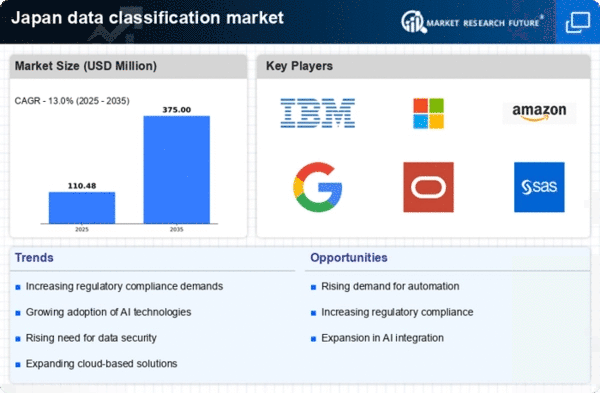Rising Data Volume
The exponential growth of data generated by businesses in Japan is a primary driver for the data classification market. As organizations increasingly rely on data for decision-making, the need to efficiently categorize and manage this information becomes paramount. In 2025, it is estimated that the total data volume in Japan will reach approximately 50 zettabytes, necessitating advanced classification solutions. This surge in data volume not only complicates data management but also amplifies the risks associated with data breaches and compliance failures. Consequently, companies are investing in data classification technologies to streamline data handling processes, enhance operational efficiency, and ensure regulatory adherence. The data classification market in Japan is likely to witness substantial growth. Organizations are seeking to implement robust classification frameworks to manage their burgeoning data assets.
Growing Cybersecurity Threats
The escalating cybersecurity threats faced by organizations in Japan are a significant driver for the data classification market. As cyberattacks become more sophisticated, the need for effective data classification to protect sensitive information is increasingly recognized. In 2025, it is estimated that cybercrime will cost Japanese businesses over $30 billion annually, underscoring the urgency for robust data protection measures. Data classification enables organizations to identify and prioritize sensitive data, ensuring that appropriate security measures are applied. This proactive approach not only helps in mitigating risks but also aids in compliance with regulatory requirements. The data classification market is poised for growth as businesses invest in technologies that enhance their cybersecurity posture through effective data categorization.
Adoption of Cloud Technologies
The increasing adoption of cloud technologies in Japan is driving the demand for data classification solutions. As organizations migrate their data to cloud environments, the complexity of managing and classifying data escalates. In 2025, it is anticipated that over 60% of Japanese businesses will utilize cloud services, creating a pressing need for effective data classification mechanisms. These mechanisms are crucial for ensuring that data stored in the cloud is appropriately categorized, secured, and compliant with relevant regulations. Furthermore, the integration of data classification tools with cloud platforms enhances data visibility and control, allowing organizations to respond swiftly to potential security threats. The data classification market is likely to experience robust growth as companies seek to leverage cloud technologies while maintaining stringent data management practices.
Emergence of Advanced Analytics
The rise of advanced analytics in Japan is reshaping the landscape of the data classification market. Organizations are increasingly leveraging analytics tools to derive insights from their data, necessitating effective classification to ensure data quality and relevance. By 2025, it is projected that approximately 55% of Japanese companies will implement advanced analytics solutions, which will require robust data classification frameworks to support data integrity. This trend indicates a shift towards data-driven decision-making, where accurate classification plays a vital role in enhancing analytical outcomes. As businesses recognize the importance of data classification in optimizing analytics processes, the market is expected to grow, driven by the demand for solutions that facilitate the seamless integration of classification and analytics.
Increased Focus on Data Privacy
In Japan, the heightened emphasis on data privacy is significantly influencing the data classification market. With the implementation of stringent data protection regulations, such as the Act on the Protection of Personal Information (APPI), organizations are compelled to adopt comprehensive data classification strategies. These strategies are essential for identifying and safeguarding sensitive information, thereby mitigating the risk of data breaches. As of 2025, it is projected that over 70% of Japanese enterprises will prioritize data classification as a critical component of their data governance frameworks. This shift not only reflects a growing awareness of privacy concerns but also indicates a proactive approach to compliance. The data classification market is expected to expand as businesses invest in technologies that facilitate the effective categorization and protection of personal data.
















